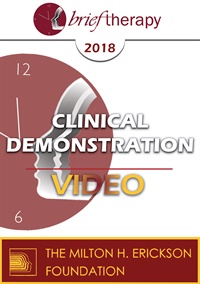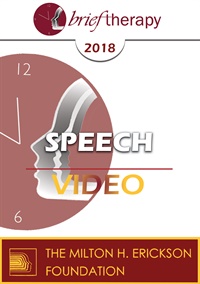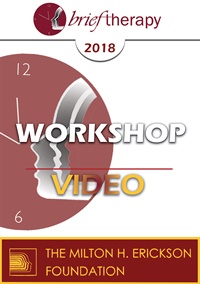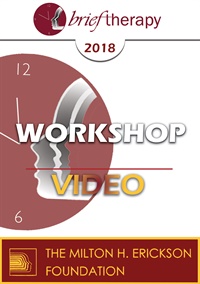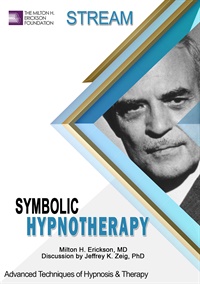
Credit available - Click Here for more information
- Average Rating:
- Not yet rated
- Topic Areas:
- Hypnosis | Advanced Techniques of Hypnosis & Therapy | Continuing Education | Ericksonian Hypnosis and Therapy Techniques | Hypnotherapy | Milton Erickson | Communication | Metaphors
- Categories:
- Advanced Techniques of Hypnosis & Therapy | Featured | Training Videos | Online Continuing Education | Milton H. Erickson Collections
- Faculty:
- Jeffrey Zeig, PhD | Milton H. Erickson, MD
- Course Levels:
- Master Degree or Higher in Health-Related Field
- Duration:
- 02:38:00
- Format:
- Audio and Video
- Original Program Date:
- Dec 31, 1977
- Short Description:
- This training tool contains segments of hypnotherapy conducted by Erickson, with the same subject, on two consecutive days in 1978. Erickson demonstrates how symbols may be used as metaphoric forms of communication to foster new ideas and understandings. Zeig discusses Erickson’s technique.
- Price:
- $75.00 - Base Price
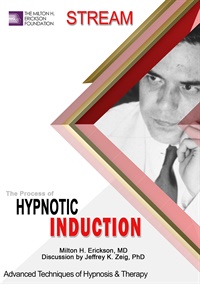
Credit available - Click Here for more information
- Average Rating:
- Not yet rated
- Topic Areas:
- Hypnosis | Hypnotic Induction | Advanced Techniques of Hypnosis & Therapy | Continuing Education | Ericksonian Hypnosis and Therapy Techniques | Milton Erickson
- Categories:
- Advanced Techniques of Hypnosis & Therapy | Featured | Training Videos | Online Continuing Education | Milton H. Erickson Collections
- Faculty:
- Milton H. Erickson, MD | Jeffrey Zeig, PhD
- Course Levels:
- Master Degree or Higher in Health-Related Field
- Duration:
- 01:54:00
- Format:
- Audio and Video
- Original Program Date:
- Dec 31, 1963
- Short Description:
- The Process of Hypnotic Induction features Erickson in 1964, working with several different subjects. He demonstrates how to individualize the method of induction to fit the unique characteristics of the individual. Jeffrey Zeig discusses the microdynamics of technique that Erickson used in his 1964 inductions. Comments are aimed at clinicians experienced in hypnosis looking to refine their skills.
- Price:
- $75.00 - Base Price
Credit available - Click Here for more information
- Average Rating:
- Not yet rated
- Topic Areas:
- Hypnosis | Advanced Techniques of Hypnosis & Therapy | Continuing Education | Ericksonian Hypnosis and Therapy Techniques | Milton Erickson | Seeding | Utilization | Marriage
- Categories:
- Advanced Techniques of Hypnosis & Therapy | Featured | Training Videos | Online Continuing Education | Milton H. Erickson Collections
- Faculty:
- Milton H. Erickson, MD | Jeffrey Zeig, PhD
- Course Levels:
- Master Degree or Higher in Health-Related Field
- Duration:
- 02:27:00
- Format:
- Audio and Video
- Original Program Date:
- Dec 31, 1977
- Short Description:
- This hypnotherapeutic session took place in 1978, and decades later, it’s just as powerful and engaging. Enhancing the viewer’s learning experience is Dr. Zeig’s discussion of the underlying elements of Erickson’s methods: the ARE model of instruction; the art of parallel communication; targeted utilization; and the use of implication. Erickson’s fluid repertoire, drawn from systematic thinking, includes the use of anecdotes, symbolic communication, and strategic seeding. The elicitation of solutions, based on promoting constructive associations and flexible thoughts and feelings, is an area of particular interest and one in which Erickson was especially elegant.
- Price:
- $75.00 - Base Price
Credit available - Click Here for more information
- Average Rating:
- Not yet rated
- Topic Areas:
- Hypnosis | Psychotherapy | Advanced Techniques of Hypnosis & Therapy | Resistance | Ericksonian Hypnosis and Therapy Techniques | Milton Erickson | Confusion Technique | Continuing Education | Hypnotherapy | Naturalistic | Seeding
- Categories:
- Advanced Techniques of Hypnosis & Therapy | Training | Milton H. Erickson Collections | German | World Languages
- Faculty:
- Milton H. Erickson, MD | Jeffrey Zeig, PhD
- Course Levels:
- Master Degree or Higher in Health-Related Field
- Duration:
- 1 Hour 55 Min
- Format:
- Audio and Video
- Original Program Date:
- Dec 31, 1978
- Short Description:
- German dub. Dr. Zeig introduces original 1979 footage and reveals Dr. Erickson's patterns with understandings cleaned from discussion with Dr. Erickson himself.
- Price:
- $65.00 - Base Price
Credit available - Click Here for more information
- Average Rating:
- Not yet rated
- Topic Areas:
- Clinical Demonstrations | Continuing Education | Couples Therapy | Therapist Techniques
- Categories:
- Brief Therapy Conference | Brief Therapy Conference 2018 | Online Continuing Education | Pioneers in Couples and Family Therapy
- Faculty:
- Stan Tatkin, PsyD, MFT
- Course Levels:
- Master Degree or Higher in Health-Related Field
- Duration:
- 1:00:43
- Format:
- Audio and Video
- Original Program Date:
- Dec 08, 2018
- Short Description:
- This clinical demonstration showcases the Lovers Pose, a powerful somatic intervention in couple therapy designed to access and repair implicit memory and early attachment wounds. The pose draws on archetypal postures—caregiver-infant, inner child, and even the Pietà—placing partners in intentional roles guided by the therapist. With sustained eye contact and physical closeness, it induces a parasympathetic state that fosters emotional co-regulation, physiological attunement, and deep relational healing.
- Price:
-
Sale is $29.00
price reduced from Base Price - $59.00
Credit available - Click Here for more information
- Average Rating:
- Not yet rated
- Topic Areas:
- Speeches | Relationships | Trauma | Continuing Education | Brief Therapy | Intimacy
- Categories:
- Brief Therapy Conference | Brief Therapy Conference 2018 | Online Continuing Education
- Faculty:
- Laura Brown, PhD
- Course Levels:
- Master Degree or Higher in Health-Related Field
- Duration:
- 1:03:11
- Format:
- Audio and Video
- Original Program Date:
- Dec 08, 2018
- Short Description:
- BT18 Speech 14 - Helping Trauma Survivors to Have the Relationships They Deserve - Laura Brown, PhD Survivors of complex childhood trauma --systemic abuse, neglect, and disrupted attachment schemata -- enter adulthood with internal working models of relationship that often lead them into difficult and painful connections with others. I will address the specific challenges in empowering these survivors to stop "paying the price of admission" to intimacy, and discuss how therapists can find effective strategies for addressing pre-verbal and early verbal core beliefs about self, being lovable, and being safe in relationships.
- Price:
-
Sale is $29.00
price reduced from Base Price - $59.00
Credit available - Click Here for more information
- Average Rating:
- Not yet rated
- Topic Areas:
- Workshops | Psychobiological Approach to Couples Therapy (PACT) | Continuing Education | Couples Therapy
- Categories:
- Brief Therapy Conference | Brief Therapy Conference 2018 | Online Continuing Education | Pioneers in Couples and Family Therapy
- Faculty:
- Stan Tatkin, PsyD, MFT
- Course Levels:
- Master Degree or Higher in Health-Related Field
- Duration:
- 2:00:42
- Format:
- Audio and Video
- Original Program Date:
- Dec 07, 2018
- Short Description:
- This workshop explores projective identification in couple therapy—a powerful yet often overlooked dynamic where partners unconsciously project disowned feelings onto each other. Through video demonstrations and clinical techniques like cross-tracking and circular questioning, therapists learn to spot nonverbal cues and emotional undercurrents. Emphasizes brain-based strategies and practical interventions to decode implicit communication and accelerate therapeutic progress.
- Price:
-
Sale is $29.00
price reduced from Base Price - $59.00
Credit available - Click Here for more information
- Average Rating:
- Not yet rated
- Topic Areas:
- Workshops | Depression | Continuing Education | Brief Therapy | Neuroscience | Psychopharmacology
- Categories:
- Brief Therapy Conference | Brief Therapy Conference 2018 | Online Continuing Education
- Faculty:
- Bill O'Hanlon, MS
- Course Levels:
- Master Degree or Higher in Health-Related Field
- Duration:
- 1:42:03
- Format:
- Audio and Video
- Original Program Date:
- Dec 07, 2018
- Short Description:
- Recent research and insights have given a new understanding of depression, not as a deficit in chemicals, but as a problem with neurogenesis (new brain growth and connection). Antidepressants may work by promoting brain cell and neuronal growth and connection, but there are other ways, within the grasp of therapists, counselors and addiction specialists that can make an immediate and lasting difference in helping relieve depression. This session will give three simple methods for relieving depression using insights from recent brain science.
- Price:
-
Sale is $29.00
price reduced from Base Price - $59.00
Credit available - Click Here for more information
- Average Rating:
- Not yet rated
- Topic Areas:
- Couples Therapy | Keynotes | Continuing Education | Therapist Development | Clinical Psychology
- Categories:
- Couples Conference | Couples Conference 2018 | Online Continuing Education | Pioneers in Couples and Family Therapy
- Faculty:
- Ellyn Bader, PhD | Sue Diamond, MA, RCC
- Course Levels:
- Master Degree or Higher in Health-Related Field
- Duration:
- 1:00:59
- Format:
- Audio and Video
- Original Program Date:
- May 04, 2018
- Short Description:
- Sue Diamond Potts interviews Dr. Ellyn Bader about her 33 years specializing in couples therapy. They discuss what it was like when she started and how the field has changed. They especially focus on what Ellyn has learned from consulting to couples therapists from 33 countries. Ellyn also describes common mistakes therapists make and what it takes to help couples and couples therapists evolve.
- Price:
- $0.00 - $29.00
Credit available - Click Here for more information
- Average Rating:
- Not yet rated
- Topic Areas:
- Addiction | Keynotes | Continuing Education | Love | Couples Therapy | Neuroscience | Sex and Sexuality
- Categories:
- Couples Conference | Couples Conference 2018 | Online Continuing Education
- Faculty:
- Helen E. Fisher, PhD
- Course Levels:
- Master Degree or Higher in Health-Related Field
- Duration:
- 57:05
- Format:
- Audio and Video
- Original Program Date:
- May 04, 2018
- Short Description:
- Biological anthropologist Helen Fisher discusses three brain systems that evolved for mating and reproduction: the sex drive; feelings of intense romantic love; and feelings of deep attachment to a long term partner. She then focuses on her brain scanning research (using fMRI) on romantic rejection and the trajectory of love addiction following rejection. She concludes with discussion of the brain circuits associated with long-term partnership happiness and the future of relationships in the dig
- Price:
-
Sale is $29.00
price reduced from Base Price - $59.00
Credit available - Click Here for more information
- Average Rating:
- Not yet rated
- Topic Areas:
- Keynotes | Continuing Education | Couples Therapy | Community | IMAGO | Relationships
- Categories:
- Couples Conference | Couples Conference 2018 | Online Continuing Education | Pioneers in Couples and Family Therapy
- Faculty:
- Harville Hendrix, PhD | Helen LaKelly Hunt, PhD
- Course Levels:
- Master Degree or Higher in Health-Related Field
- Duration:
- 54:42
- Format:
- Audio and Video
- Original Program Date:
- May 05, 2018
- Short Description:
- This keynote highlights the vision behind Safe Conversations and the Dallas Project, a large-scale initiative to improve relational health citywide. Hendrix and Hunt share how teaching dialogue, empathy, and zero-negativity practices can reduce divorce, poverty, and social fragmentation. They emphasize connection as a cultural foundation and present couples as catalysts for societal healing, promoting a shift from individual to relational models of mental health.
- Price:
-
Sale is $29.00
price reduced from Base Price - $59.00
Credit available - Click Here for more information
- Average Rating:
- Not yet rated
- Topic Areas:
- Keynotes | Continuing Education | Couples Therapy | Gender | Masculinity
- Categories:
- Couples Conference | Couples Conference 2018 | Online Continuing Education | Pioneers in Couples and Family Therapy
- Faculty:
- Terry Real, LICSW
- Course Levels:
- Master Degree or Higher in Health-Related Field
- Duration:
- 33:57
- Format:
- Audio and Video
- Original Program Date:
- May 05, 2018
- Short Description:
- A leading expert on male psychology shares insights on the evolving nature of masculinity, examining both progress and backlash in the cultural landscape. He encourages therapists to help men reconnect with vulnerability and emotions, using truth-based techniques to build healthy self-esteem and relational strength. The talk underscores the vital role of women therapists and the importance of clinical skill over gender in fostering meaningful therapeutic change.
- Price:
- $0.00 - $29.00
Credit available - Click Here for more information
- Average Rating:
- Not yet rated
- Topic Areas:
- Attachment | Neuroscience | Keynotes | Continuing Education | Differentiation | Couples Therapy
- Categories:
- Couples Conference | Couples Conference 2018 | Online Continuing Education | Pioneers in Couples and Family Therapy
- Faculty:
- Stan Tatkin, PsyD, MFT
- Course Levels:
- Master Degree or Higher in Health-Related Field
- Duration:
- 50:59
- Format:
- Audio and Video
- Original Program Date:
- May 06, 2018
- Short Description:
- This presentation integrates foundational theories of attachment, differentiation, and individuation with current neuroscience to inform a psychobiological approach to couple therapy. Tatkin examines how early developmental models apply to partners with varying social-emotional complexity, highlighting deficits like alexithymia and theory of mind. Clinicians are encouraged to adapt interventions based on cognitive capacity and emphasize face-to-face, collaborative engagement in session.
- Price:
-
Sale is $29.00
price reduced from Base Price - $59.00
Credit available - Click Here for more information
- Average Rating:
- Not yet rated
- Topic Areas:
- Law & Ethics | Continuing Education | Couples Therapy | Therapist Development
- Categories:
- Couples Conference | Couples Conference 2018 | Online Continuing Education
- Faculty:
- A. Steven Frankel, PhD, JD, ABPP
- Course Levels:
- Master Degree or Higher in Health-Related Field
- Duration:
- 3:33:07
- Format:
- Audio and Video
- Original Program Date:
- May 03, 2018
- Short Description:
- This six-hour program seeks to provide information and recommendations for mental health professionals whose work includes the assessment and treatment of couples and families. The program begins with an update on legal and ethical developments that affect providers, and then moves to a discussion of risk management strategies for clinicians, including the most critical issues faced by clinicians in their work. We continue with important issues concerning confidentiality and “secrets"
- Price:
- $0.00 - $29.00
Credit available - Click Here for more information
- Average Rating:
- Not yet rated
- Topic Areas:
- Continuing Education | Law & Ethics | Couples Therapy | Therapist Development
- Categories:
- Couples Conference | Couples Conference 2018 | Online Continuing Education
- Faculty:
- A. Steven Frankel, PhD, JD, ABPP
- Course Levels:
- Master Degree or Higher in Health-Related Field
- Duration:
- 1:09:54
- Format:
- Audio and Video
- Original Program Date:
- May 03, 2018
- Short Description:
- This six-hour program seeks to provide information and recommendations for mental health professionals whose work includes the assessment and treatment of couples and families. The program begins with an update on legal and ethical developments that affect providers, and then moves to a discussion of risk management strategies for clinicians, including the most critical issues faced by clinicians in their work. We continue with important issues concerning confidentiality and “secrets"
- Price:
-
Sale is $29.00
price reduced from Base Price - $59.00
Credit available - Click Here for more information
- Average Rating:
- Not yet rated
- Topic Areas:
- Addiction | Couples Therapy | Workshops | Continuing Education | Love | Neurobiology | Neuroscience
- Categories:
- Couples Conference | Couples Conference 2018 | Online Continuing Education
- Faculty:
- Helen E. Fisher, PhD
- Course Levels:
- Master Degree or Higher in Health-Related Field
- Duration:
- 1:57:48
- Format:
- Audio and Video
- Original Program Date:
- May 04, 2018
- Short Description:
- Biological Anthropologist Helen Fisher discusses four broad basic styles of thinking and behaving associated with four primary brain systems: the dopamine, serotonin, and testosterone and estrogen/oxytocin systems. She discusses why people are predisposed to love one person rather than another (mate choice). She hypothesizes that individuals who primarily express of the constellation of traits linked with each of these brain systems may be predisposed to different forms of love addiction, includ
- Price:
-
Sale is $29.00
price reduced from Base Price - $59.00
Credit available - Click Here for more information
- Average Rating:
- Not yet rated
- Topic Areas:
- Workshops | Continuing Education | Marriage | Passive-Aggressiveness | Couples Therapy
- Bundle(s):
- Learning Track - Couples Starter Kit
- Categories:
- Couples Conference | Couples Conference 2018 | Online Continuing Education
- Faculty:
- Peter Pearson, PhD
- Course Levels:
- Master Degree or Higher in Health-Related Field
- Duration:
- 2:01:25
- Format:
- Audio and Video
- Original Program Date:
- May 05, 2018
- Short Description:
- Passive aggressive spouses challenge even seasoned couple’s therapists. One partner over functions and the other under functions. Both become entrenched in this pattern. And the passive aggressive partner stubbornly resists your best insights and agreements for change. As conventional therapy often falls flat with this couple, I will do a demonstration showing you to stay out of the middle and create an unconventional leverage for change. Leave with a comprehensive framework for changing
- Price:
-
Sale is $29.00
price reduced from Base Price - $59.00

Credit available - Click Here for more information
- Average Rating:
- Not yet rated
- Topic Areas:
- Law & Ethics | Continuing Education | Couples Therapy | Family Therapy | Therapist Development
- Bundle(s):
- CC19 Main Conference Audio Bundle
- Categories:
- Couples Conference | Couples Conference 2019 | Online Continuing Education
- Faculty:
- A. Steven Frankel, PhD, JD, ABPP
- Duration:
- 2:59:37
- Format:
- Audio Only
- Original Program Date:
- Apr 11, 2019
- Short Description:
- This six-hour program seeks to provide information and recommendations for mental health professionals whose work includes the assessment and treatment of couples and families. The program begins with an update on legal and ethical developments that affect providers, and then moves to a discussion of risk management strategies for clinicians, including the most critical issues faced by clinicians in their work.
- Price:
- $15.00 - Base Price

Credit available - Click Here for more information
- Average Rating:
- Not yet rated
- Topic Areas:
- Law & Ethics | Continuing Education | Couples Therapy | Family Therapy | Therapist Development
- Bundle(s):
- CC19 Main Conference Audio Bundle
- Categories:
- Couples Conference | Couples Conference 2019 | Online Continuing Education
- Faculty:
- A. Steven Frankel, PhD, JD, ABPP
- Duration:
- 2:01:41
- Format:
- Audio Only
- Original Program Date:
- Apr 11, 2019
- Short Description:
- This six-hour program seeks to provide information and recommendations for mental health professionals whose work includes the assessment and treatment of couples and families. The program begins with an update on legal and ethical developments that affect providers, and then moves to a discussion of risk management strategies for clinicians, including the most critical issues faced by clinicians in their work.
- Price:
- $15.00 - Base Price

Credit available - Click Here for more information
- Average Rating:
- Not yet rated
- Topic Areas:
- Workshops | Psychobiological Approach to Couples Therapy (PACT) | Continuing Education | Couples Therapy
- Bundle(s):
- CC19 Main Conference Audio Bundle | CC19 Individual Selections
- Categories:
- Couples Conference | Couples Conference 2019 | Online Continuing Education | Pioneers in Couples and Family Therapy
- Faculty:
- Stan Tatkin, PsyD, MFT
- Duration:
- 1:55:42
- Format:
- Audio Only
- Original Program Date:
- Apr 13, 2019
- Short Description:
- PACT offers a fast-paced, polytheoretical approach that blends attachment theory, arousal regulation, and developmental neuroscience. This workshop trains therapists to assess microexpressions, distinguish defenses from deficits, and use creative interventions to move couples toward secure functioning. Emphasizing strategic, somatically informed techniques, PACT equips clinicians to work effectively with high-conflict and complex relational systems.
- Price:
- $15.00 - Base Price

Credit available - Click Here for more information
- Average Rating:
- Not yet rated
- Topic Areas:
- Workshops | Psychobiological Approach to Couples Therapy (PACT) | Continuing Education | Couples Therapy
- Bundle(s):
- CC19 Main Conference Audio Bundle | CC19 Individual Selections
- Categories:
- Couples Conference | Couples Conference 2019 | Online Continuing Education | Pioneers in Couples and Family Therapy
- Faculty:
- Stan Tatkin, PsyD, MFT
- Duration:
- 2:03:44
- Format:
- Audio Only
- Original Program Date:
- Apr 13, 2019
- Short Description:
- PACT integrates attachment, neuroscience, and arousal regulation to treat complex relational dynamics. This workshop trains clinicians to identify somatic cues, use strategic interventions, and guide partners toward secure functioning. Through cross-tracking, staging, and deep data gathering, therapists learn to assess attachment, manage betrayal, and foster real-time collaboration—even in high-conflict or avoidant couples.
- Price:
- $15.00 - Base Price

Credit available - Click Here for more information
- Average Rating:
- Not yet rated
- Topic Areas:
- Workshops | Psychobiological Approach to Couples Therapy (PACT) | Personality Disorders | Continuing Education | Couples Therapy
- Bundle(s):
- CC19 Main Conference Audio Bundle | CC19 Individual Selections
- Categories:
- Couples Conference | Couples Conference 2019 | Online Continuing Education | Pioneers in Couples and Family Therapy
- Faculty:
- Stan Tatkin, PsyD, MFT
- Duration:
- 3:06:45
- Format:
- Audio Only
- Original Program Date:
- Apr 14, 2019
- Short Description:
- This advanced PACT workshop explores how to work effectively with personality-disordered partners, distinguishing structural deficits from insecure attachment. Drawing from object relations and ego psychology, it examines disorders like borderline and narcissistic personality, emphasizing projective identification, betrayal, and power dynamics. Techniques focus on fostering secure functioning while navigating trauma, trust ruptures, and cultural influences within couple systems.
- Price:
- $15.00 - Base Price

Credit available - Click Here for more information
- Average Rating:
- Not yet rated
- Topic Areas:
- Couples Therapy | Love | Continuing Education | Keynotes
- Categories:
- Couples Conference | Couples Conference 2021 | Online Continuing Education | Pioneers in Couples and Family Therapy
- Faculty:
- Stan Tatkin, PsyD, MFT
- Course Levels:
- Master Degree or Higher in Health-Related Field
- Duration:
- 1 Hour 2 Minutes
- Format:
- Audio and Video
- Original Program Date:
- Jun 05, 2021
- Short Description:
- An exploration of how principle-based relationships—grounded in shared purpose, vision, and governance—can anchor couples amid stress, miscommunication, and human fallibility. Emphasizing co-regulation and mutual accountability, the session highlights how therapists can guide partners toward secure functioning while attending to broader ethical, social, and psychological dimensions of relational life.
- Price:
- $29.00 - Base Price

Credit available - Click Here for more information
- Average Rating:
- Not yet rated
- Topic Areas:
- Couples Therapy | Sex and Sexuality | Continuing Education | LGBTQ | Gender | Keynotes | Relationships
- Categories:
- Couples Conference | Couples Conference 2021 | Online Continuing Education
- Faculty:
- Joseph Winn, MSW, LICSW, CST-S
- Course Levels:
- Master Degree or Higher in Health-Related Field
- Duration:
- 1 Hour 2 Minutes
- Format:
- Audio and Video
- Original Program Date:
- Jun 06, 2021
- Short Description:
- This keynote will highlight core themes that are imperative for therapists to consider before working with relational systems that exist beyond the purview of heteronormativity. Specific topics will include becoming aware of ones sexological world views, understanding and working with sexual and relational health, and exploring what variant sexual, erotic and relational systems may offer heteronormative and monogamous couples in terms of increasing vulnerability, differentiation, and deepening relational attunement.
- Price:
- $29.00 - Base Price

Credit available - Click Here for more information
- Average Rating:
- Not yet rated
- Topic Areas:
- Couples Therapy | LGBTQ | Continuing Education | Keynotes | Gender
- Categories:
- Couples Conference | Couples Conference 2021 | Online Continuing Education
- Faculty:
- Shawn Giammattei, PhD
- Course Levels:
- Master Degree or Higher in Health-Related Field
- Duration:
- 1 Hour 9 Minutes
- Format:
- Audio and Video
- Original Program Date:
- Jun 06, 2021
- Short Description:
- Dr. Giammattei will present the underlying framework that therapists who work with transgender or gender expansive (TGE) couples need to understand in order to provide gender affirming treatment. He will share ways to explore your own hetero/cis-normative beliefs around coupling and how these influence the models you choose, the questions you ask, and the interventions you use. While TGE couples experience many of the same issues as other couples, we will explore the minority stress and unique stressors that impact these issues in profound ways.
- Price:
- $29.00 - Base Price




